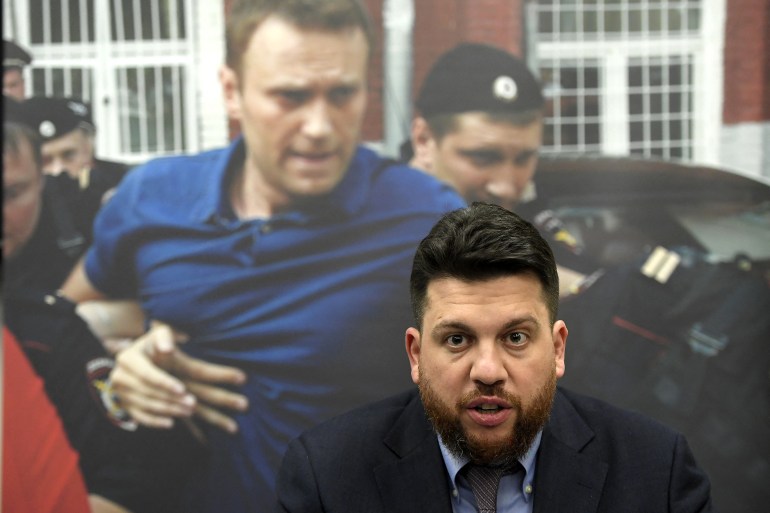ARTICLE AD
Former strategist to Russian opposition leader was admitted to hospital after the assault on Tuesday night.
Published On 13 Mar 2024
Leonid Volkov, a close ally of Russian opposition leader Alexey Navalny who died last month in a remote penal colony, has been admitted to hospital after being attacked with a hammer outside his home in Vilnius, the Lithuanian capital.
Volkov is one of Russia’s most prominent opposition figures and was Navalny’s former chief of staff and, until recently, chair of his Anti-Corruption Foundation.
The Kremlin ordered a warrant for Volkov’s arrest in 2021.
“Leonid Volkov has just been attacked outside his house. Someone broke a car window and sprayed tear gas in his eyes, after which the attacker started hitting Leonid with a hammer,” Navalny spokeswoman Kira Yarmysh wrote on social media platform X on Tuesday night.
Volkov’s wife Anna Biryukova also shared photos of her husband’s injuries on social media, including a black eye, a red mark on his forehead and bleeding on his leg, which had soaked through his jeans.
Navalny’s team later shared an image of Volkov being carried into an ambulance on a stretcher, and taken to hospital.
Lithuania’s Foreign Minister Gabrielius Landsbergis called the assault, which took place at about 10pm local time (20:00 GMT), “shocking”.
The “perpetrators will have to answer for their crime”, he wrote on X.
The attack took place nearly a month after Navalny’s unexplained death in the penal colony where he was serving a 19-year prison term on charges of extremism, widely seen as politically motivated.
Navalny, President Vladimir Putin’s fiercest critic, had been jailed since January 2021 when he returned to Moscow to face certain arrest following treatment in Germany after being poisoned with Novichok, a nerve agent. Navalny’s Foundation for the Fight Against Corruption and a network of regional offices were designated as “extremist organisations” by the Russian government that same year.
Navalny’s death, reported by prison authorities on February 16, sent shockwaves around the globe, with opposition figures and Western leaders laying the blame on the Kremlin, which rejected the allegations.
The 47-year-old politician’s funeral in Moscow on March 1 drew thousands of supporters, a rare show of defiance in Putin’s Russia amid a ruthless crackdown on dissent.
 Volkov was a prominent ally of Russian opposition leader Alexey Navalny who died last month in a remote penal colony in the Russian Arctic [Frederick Florin/AFP]
Volkov was a prominent ally of Russian opposition leader Alexey Navalny who died last month in a remote penal colony in the Russian Arctic [Frederick Florin/AFP]
Volkov left Russia in 2019 under pressure from the authorities.
Last year, he and his team launched a project called “Navalny’s Campaigning Machine,” with the goal of talking to as many Russians as possible, either by phone or online, and turning them against Putin ahead of the March 15-17 presidential election.
Not long before his death, Navalny urged supporters to go to the polls at noon on Sunday, the final day of voting, to demonstrate their discontent with the Kremlin. His allies have been actively promoting the strategy, dubbed “Noon Against Putin”, in recent weeks.
Russian independent news outlet Meduza said it interviewed Volkov several hours before the attack and he said he was worried for his safety following Navalny’s death.
“The key risk now is that we will all be killed. Why, it’s a pretty obvious thing,” the outlet quoted him as saying.
Lithuanian police said they had been informed a man was beaten outside his home and were investigating.
Police fenced off a pine forest near Volkov’s house on Vilnius’s northern outskirts and officers with dogs and flashlights were seen searching the area late on Tuesday night.
Lithuania, a European Union member, is home to many Russian exiles and has been a staunch supporter of Ukraine since Russia launched its full-scale invasion of Ukraine in February 2022.
Source
:
Al Jazeera and news agencies

 9 months ago
49
9 months ago
49 
